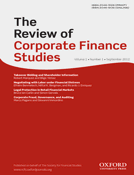
Review of Corporate Finance Studies
Scope & Guideline
Leading the Discourse in Corporate Finance Excellence
Introduction
Aims and Scopes
- Corporate Governance and Firm Performance:
Investigates the relationship between corporate governance structures, managerial practices, and overall firm performance, including how governance impacts decision-making processes and financial outcomes. - Market Dynamics and Financial Intermediation:
Explores the roles of different financial intermediaries, including banks and venture capitalists, in shaping market behavior, financing decisions, and the allocation of resources within the economy. - Behavioral Finance and Investor Behavior:
Examines how psychological factors influence investor behavior and decision-making processes in financial markets, including the effects of biases and heuristics on investment outcomes. - Financial Regulation and Policy Implications:
Analyzes the impact of regulatory frameworks on corporate finance practices, including how changes in policy can affect market stability, competition, and firm strategies. - Social and Environmental Impact of Finance:
Focuses on the integration of environmental, social, and governance (ESG) factors in corporate finance, examining how these dimensions influence investment decisions and firm valuations.
Trending and Emerging
- Impact of ESG on Corporate Finance:
An increasing number of studies are examining how environmental, social, and governance (ESG) factors influence corporate financing decisions and overall firm performance, signaling a shift towards responsible investment. - Digital Transformation and FinTech:
The rise of financial technology (FinTech) is a prominent theme, with research focusing on how digital innovations are reshaping corporate finance practices and investor behaviors. - Behavioral Insights in Corporate Decision-Making:
There is a growing trend towards integrating behavioral finance insights into corporate decision-making processes, highlighting how psychological factors can significantly impact financial outcomes. - Policy Uncertainty and Its Effects on Finance:
Research is increasingly addressing the effects of policy uncertainty on corporate finance, particularly how external political and economic factors influence investment strategies and financial stability. - Diversity and Inclusion in Finance:
Emerging studies are focusing on the role of diversity in corporate governance and finance, exploring how inclusive practices can enhance decision-making and firm performance.
Declining or Waning
- Traditional Valuation Models:
Research focused on classical valuation models seems to be diminishing, possibly due to the increasing complexity of financial instruments and the need for more dynamic, context-specific approaches to valuation. - Static Capital Structure Theories:
The focus on static models of capital structure is waning as scholars shift towards more dynamic and situational analyses that consider the impacts of market conditions and firm-specific factors. - Conventional Risk Assessment Frameworks:
There is a noticeable decline in studies solely relying on traditional risk assessment frameworks, as newer methodologies incorporating behavioral and systemic risk perspectives gain traction.
Similar Journals
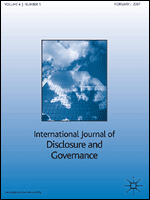
International Journal of Disclosure and Governance
Catalyzing research in economics and governance excellence.The International Journal of Disclosure and Governance, published by Palgrave Macmillan Ltd, is a pivotal platform in the fields of Accounting, Business, Economics, Finance, and Management. With an ISSN of 1741-3591 and an E-ISSN of 1746-6539, this esteemed journal serves as a valuable resource for researchers, professionals, and students alike, looking to explore the intricacies of governance and transparency in financial practices and corporate strategies. As evidenced by its performance, the journal has achieved a commendable Q2 ranking across multiple categories in 2023, signifying its influential role within academic discourse, particularly in Economics and International Management. With a history that spans from 2009 to 2024, the journal provides insights that are essential for advancing knowledge and practice in a rapidly evolving global environment. While it operates under a subscription model, the work published here remains impactful, ensuring readers have access to high-quality research that can drive both theory and application forward.

Review of Pacific Basin Financial Markets and Policies
Navigating Trends and Policies Across the PacificThe Review of Pacific Basin Financial Markets and Policies is a prominent academic journal dedicated to exploring the dynamic landscape of financial markets and policies within the Pacific Basin region. Published by World Scientific Publishing Co. Pte Ltd and based in Singapore, this journal serves as a vital platform for researchers, professionals, and students interested in the intricacies of finance and economics. With an ISSN of 0219-0915 and E-ISSN 1793-6705, it encompasses a broad scope addressing critical issues and emerging trends from 2003 to 2024. Despite its current positioning within the Q4 quartile for both Economics and Econometrics as well as Finance, the journal fosters invaluable contributions that encourage scholarly communication and innovation. Access to the journal is through various academic libraries and institutions, providing an essential resource for those seeking to enhance their understanding of the financial frameworks in the Pacific region.

Green Finance
Exploring the synergy between finance and environmental stewardship.Green Finance, published by the American Institute of Mathematical Sciences (AIMS), is a leading Open Access journal dedicated to the intersection of financial theory and environmental sustainability. Since its inception in 2019, it has played a crucial role in advancing scholarly research in the field of green economics, providing a platform for innovative studies that address the challenges and opportunities of integrating ecological considerations into financial models. With impressive rankings, including a 97th percentile in the Economics, Econometrics, and Finance category, and a notable impact on finance and econometrics, this journal is essential for researchers, professionals, and students who aim to contribute to sustainable financial practices. Its commitment to accessibility ensures that research output is available to a global audience, fostering collaboration and knowledge exchange. Join the conversation in this vital area and explore groundbreaking research that shapes the future of financial sustainability.
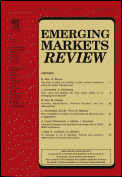
Emerging Markets Review
Illuminating Pathways for Economic AdvancementEmerging Markets Review, published by Elsevier, stands as a leading platform for scholarly discourse in the fields of Business, International Management, and Economics. With a strong focus on the dynamic and evolving landscapes of emerging markets, this journal boasts an impressive impact factor, reflecting its high-quality research and significant contribution to the academic community. Covering a wide array of topics pertinent to emerging economies, the journal is dedicated to disseminating cutting-edge research findings, theoretical advancements, and practical insights that are essential for both researchers and industry professionals. Operating since 2000, and with its converged years extending to 2024, Emerging Markets Review has secured a Q1 category ranking in both its primary domains (Business and International Management; Economics and Econometrics), underscoring its critical role in shaping knowledge and practices in these fields. The journal's esteemed reputation is further highlighted by its strong Scopus rankings, placing it among the top percentile for relevant subject areas. Although it is not an Open Access journal, it remains accessible through institutional subscriptions, ensuring that the wealth of knowledge contained within its pages reaches a broad audience.
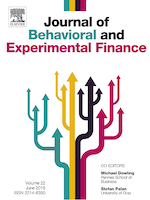
Journal of Behavioral and Experimental Finance
Decoding Financial Behavior for a Better TomorrowJournal of Behavioral and Experimental Finance, published by Elsevier, stands as a premier outlet for groundbreaking research in the realm of finance, particularly focusing on the psychological and behavioral factors that influence financial decision-making. With an ISSN of 2214-6350 and an E-ISSN of 2214-6369, this journal has established itself within the top tier, achieving a Q1 ranking in Finance for 2023, and is currently positioned 10th out of 317 journals in the Scopus category of Economics, Econometrics and Finance, demonstrating a remarkable 97th percentile ranking. Aiming to bridge theoretical advancements with practical applications, the journal encourages submissions that explore innovative methodologies and empirical studies, offering valuable insights for academics, practitioners, and students alike. As a vital resource for those interested in the confluence of psychology and finance, the Journal of Behavioral and Experimental Finance is pivotal in shaping the future of financial research and practice.

Abacus-A Journal of Accounting Finance and Business Studies
Elevating Scholarly Research in Business StudiesAbacus: A Journal of Accounting Finance and Business Studies, published by WILEY, stands as a prominent platform dedicated to advancing the fields of accounting, finance, and business studies. With a history dating back to 1965, this journal has consistently delivered high-quality research and insights, culminating in its current status as a Q2 journal in Accounting according to the 2023 category quartiles. Operating from the United Kingdom, Abacus provides essential scholarly content for researchers, practitioners, and students alike, aiming to bridge the gap between theory and practice in its diverse sub-disciplines. Although it does not currently offer open access, its reputation is underscored by a solid Scopus ranking of #83/176 in the field of Accounting, representing the 53rd percentile for quality and impact. With its continued focus on innovative research, Abacus remains a crucial resource for anyone looking to navigate the evolving landscape of accounting and finance.
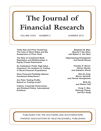
JOURNAL OF FINANCIAL RESEARCH
Transforming Financial Understanding Through ResearchThe JOURNAL OF FINANCIAL RESEARCH, published by WILEY, stands as a pivotal platform for disseminating innovative research in the fields of finance and accounting since its inception in 1978. With an ISSN of 0270-2592 and an E-ISSN of 1475-6803, this journal aims to address contemporary challenges and trends within the financial research landscape. It has achieved notable recognition, being placed in the Q2 category for both Finance and Accounting in the 2023 rankings, signifying its relevance and impact within the academic community. Although it does not currently offer open access, the journal is accessible through various academic databases, catering to a diverse audience of researchers, professionals, and students keen on advancing their knowledge and understanding of financial systems and methodologies. With an evolving scope that encompasses empirical studies, theoretical frameworks, and practical applications, the JOURNAL OF FINANCIAL RESEARCH is committed to contributing valuable insights into the complexities of financial practices and policies.
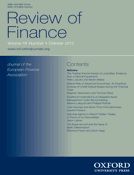
Review of Finance
Connecting theory and empirical evidence for impactful finance.The Review of Finance, published by Oxford University Press, stands as a premier academic journal in the fields of Finance, Accounting, and Economics. With an ISSN of 1572-3097 and an impressive track record stretching from 2001 to 2024, this journal is consistently recognized for its high-quality research, reflected in its Q1 rankings across key categories, including Accounting, Finance, and Economics and Econometrics. The Review of Finance is dedicated to advancing the understanding of financial phenomena through robust empirical and theoretical insights, making it an essential resource for researchers and professionals alike. Additionally, its strong Scopus rankings, placing it in the top percentiles, highlight its influence and relevance in ongoing academic discourse. Although the journal is not open access, it remains widely accessible through academic institutions, ensuring that its valuable contributions reach an extensive audience. The editorial board invites submissions that promise to further engage the academic community in the dynamic intersections of finance, accounting, and economic research.

Financial Internet Quarterly
Innovating Insights for a Dynamic Financial LandscapeFinancial Internet Quarterly is an esteemed journal published by WALTER DE GRUYTER GMBH, specializing in the dynamic intersection of finance and digital technology. Since its inception in 2015 as an Open Access journal, it has aimed to disseminate pioneering research, innovative methodologies, and critical analyses pertaining to the financial internet landscape. By addressing contemporary issues in digital finance, cybersecurity, fintech solutions, and blockchain applications, the journal seeks to provide invaluable insights for researchers, policymakers, and practitioners alike. Located in Berlin, Germany, Financial Internet Quarterly fosters collaboration among scholars and industry leaders to advance knowledge in this rapidly evolving field, making it an essential resource for anyone interested in the future of finance.
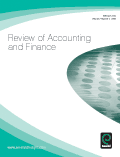
Review of Accounting and Finance
Empowering Research in Economics and AccountingReview of Accounting and Finance, published by EMERALD GROUP PUBLISHING LTD, is a prestigious academic journal with a longstanding commitment to advancing scholarship in the fields of accounting, finance, and economics. With an ISSN of 1475-7702 and E-ISSN of 1758-7700, this journal has established itself as a key resource for researchers, professionals, and students seeking robust empirical and theoretical insights. It enjoys a strong reputation, reflected in its 2023 Scopus rankings, where it is positioned in the top quartile for Economics and Finance, and holds a Q2 category in Accounting. The journal covers a wide range of topics, aiming to foster discussion and disseminate knowledge that bridges the gap between theory and practice. Although it does not offer open access, its comprehensive scope is invaluable for those dedicated to understanding the complexities of financial systems and accounting practices from a global perspective. Published continuously from 2002 to 2024, the Review of Accounting and Finance is an essential outlet for innovative research that drives the discipline forward.